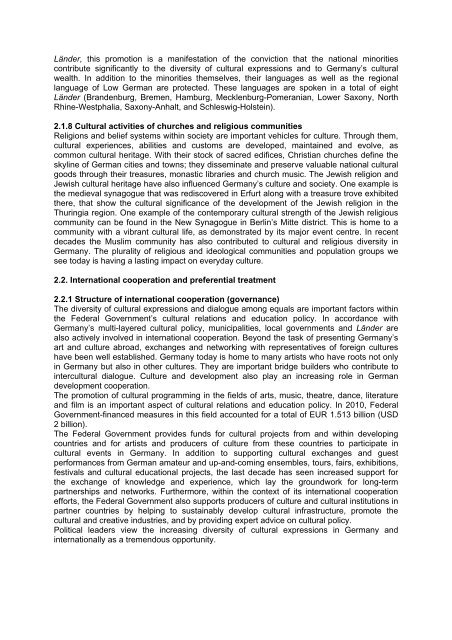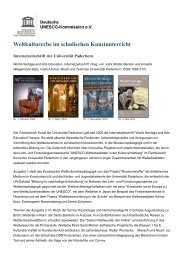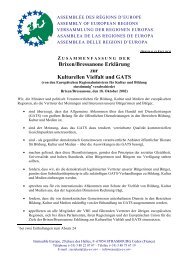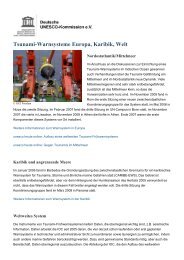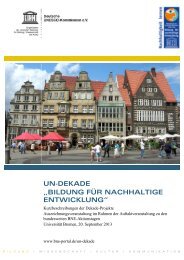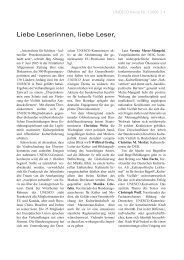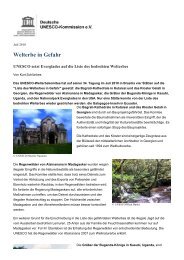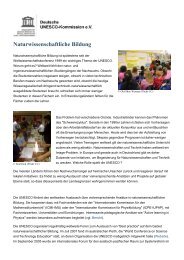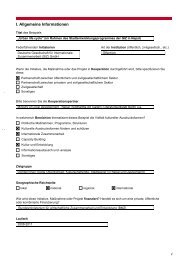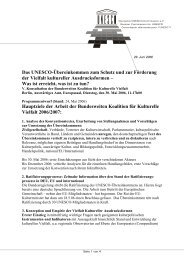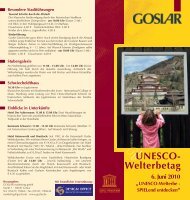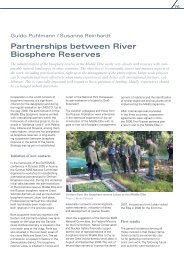Annex Form - Deutsche UNESCO-Kommission
Annex Form - Deutsche UNESCO-Kommission
Annex Form - Deutsche UNESCO-Kommission
Create successful ePaper yourself
Turn your PDF publications into a flip-book with our unique Google optimized e-Paper software.
Länder, this promotion is a manifestation of the conviction that the national minorities<br />
contribute significantly to the diversity of cultural expressions and to Germany’s cultural<br />
wealth. In addition to the minorities themselves, their languages as well as the regional<br />
language of Low German are protected. These languages are spoken in a total of eight<br />
Länder (Brandenburg, Bremen, Hamburg, Mecklenburg-Pomeranian, Lower Saxony, North<br />
Rhine-Westphalia, Saxony-Anhalt, and Schleswig-Holstein).<br />
2.1.8 Cultural activities of churches and religious communities<br />
Religions and belief systems within society are important vehicles for culture. Through them,<br />
cultural experiences, abilities and customs are developed, maintained and evolve, as<br />
common cultural heritage. With their stock of sacred edifices, Christian churches define the<br />
skyline of German cities and towns; they disseminate and preserve valuable national cultural<br />
goods through their treasures, monastic libraries and church music. The Jewish religion and<br />
Jewish cultural heritage have also influenced Germany’s culture and society. One example is<br />
the medieval synagogue that was rediscovered in Erfurt along with a treasure trove exhibited<br />
there, that show the cultural significance of the development of the Jewish religion in the<br />
Thuringia region. One example of the contemporary cultural strength of the Jewish religious<br />
community can be found in the New Synagogue in Berlin’s Mitte district. This is home to a<br />
community with a vibrant cultural life, as demonstrated by its major event centre. In recent<br />
decades the Muslim community has also contributed to cultural and religious diversity in<br />
Germany. The plurality of religious and ideological communities and population groups we<br />
see today is having a lasting impact on everyday culture.<br />
2.2. International cooperation and preferential treatment<br />
2.2.1 Structure of international cooperation (governance)<br />
The diversity of cultural expressions and dialogue among equals are important factors within<br />
the Federal Government’s cultural relations and education policy. In accordance with<br />
Germany’s multi-layered cultural policy, municipalities, local governments and Länder are<br />
also actively involved in international cooperation. Beyond the task of presenting Germany’s<br />
art and culture abroad, exchanges and networking with representatives of foreign cultures<br />
have been well established. Germany today is home to many artists who have roots not only<br />
in Germany but also in other cultures. They are important bridge builders who contribute to<br />
intercultural dialogue. Culture and development also play an increasing role in German<br />
development cooperation.<br />
The promotion of cultural programming in the fields of arts, music, theatre, dance, literature<br />
and film is an important aspect of cultural relations and education policy. In 2010, Federal<br />
Government-financed measures in this field accounted for a total of EUR 1.513 billion (USD<br />
2 billion).<br />
The Federal Government provides funds for cultural projects from and within developing<br />
countries and for artists and producers of culture from these countries to participate in<br />
cultural events in Germany. In addition to supporting cultural exchanges and guest<br />
performances from German amateur and up-and-coming ensembles, tours, fairs, exhibitions,<br />
festivals and cultural educational projects, the last decade has seen increased support for<br />
the exchange of knowledge and experience, which lay the groundwork for long-term<br />
partnerships and networks. Furthermore, within the context of its international cooperation<br />
efforts, the Federal Government also supports producers of culture and cultural institutions in<br />
partner countries by helping to sustainably develop cultural infrastructure, promote the<br />
cultural and creative industries, and by providing expert advice on cultural policy.<br />
Political leaders view the increasing diversity of cultural expressions in Germany and<br />
internationally as a tremendous opportunity.


